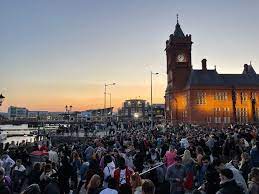- Return to sender - 20th February 2026
- Legal eagle - 19th February 2026
- Round Robin - 19th February 2026
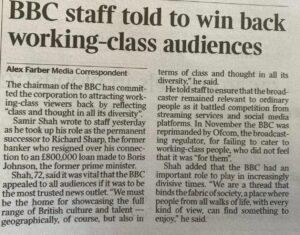 After headline news now that staff at the BBC, have been told to do more to reflect diverse UK audiences, here our Editor Phil Parry, who spent 23 years at the corporation, shows how this truism shines the spotlight on recent extraordinary scandals.
After headline news now that staff at the BBC, have been told to do more to reflect diverse UK audiences, here our Editor Phil Parry, who spent 23 years at the corporation, shows how this truism shines the spotlight on recent extraordinary scandals.
Earlier he described how he was assisted in breaking into the South Wales Echo office car when he was a cub reporter, recalled his early career as a journalist, the importance of experience in the job, and made clear that the ‘calls’ to emergency services as well as court cases are central to any media operation.
He has also explored how poorly paid most journalismis when trainee reporters had to live in squalid flats, the vital role of expenses, and about one of his most important stories on the now-scrapped 53 year-old BBC Wales TV Current Affairs series, Week In Week Out (WIWO), which won an award even after it was axed, long after his career really took off.
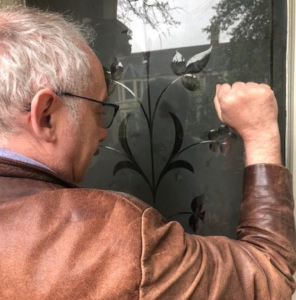
Phil has explained too how crucial it is actually to speak to people, the virtue of speed as well as accuracy, why knowledge of ‘history’ is vital, how certain material was removed from TV Current Affairs programmes when secret cameras had to be used, and some of those he has interviewed.
He has disclosed as well why investigative journalism is needed now more than ever although others have different opinions, how the coronavirus (Covid-19) lockdown played havoc with media schedules, and the importance of the hugely lower average age of some political leaders compared with when he started reporting.

Surely they should have been doing this anyway?!
The new chairman of the BBC, Samir Shah, has written to staff saying it was vital that they appealed to all audiences if it was to be the most trusted news outlet. Mr Shah said: “We must be the home for showcasing the full range of British culture and talent – geographically, of course, but also in terms of class and thought in all its diversity”. He announced that corporation workers had to ensure the huge broadcaster remained relevant to ordinary people as it battled competition from streaming services and social media platforms.

Teaching grandmother to suck eggs?
Mind you in the light of what has happened recently, perhaps this needed to be re-stated.
Let’s look first at the incredible Gary Lineker fiasco. Mr Lineker had posted a controversial tweet, apparently attacking the UK Government’s policy towards refugees, however his supporters have declared this was from his personal account, and carpeting him undermined the concept of free speech. He was then allowed back on air, but this U-turn provoked a storm of criticism, and politicians as well as sports stars poked fun at the BBC over it.

Mr Lineker said modestly, if triumphantly, on Twitter/X: “After a surreal few days, I’m delighted that we have navigated a way through this. I want to thank you all for the incredible support, particularly my colleagues at BBC Sport, for the remarkable show of solidarity”.
An ‘independent review’ was to look into social media guidelines, as the BBC’s Director General Tim Davie denied that reinstating the former England footballer amounted to a climbdown by the corporation.

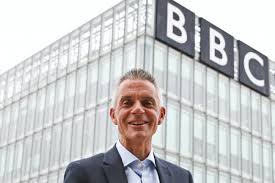
However some Tory MPs were furious at the decision to bring Mr Lineker back, proclaiming it gave him “carte blanche” to say what he liked on social media, despite Mr Davie insisting that until the review report was published, he would “abide by the editorial guidelines.
Then there was the unbelievable Huw Edwards affair. On July 12, after days of speculation about who the presenter was who had been suspended for allegedly paying £35,000 to a teenager in exchange for sexually explicit images, Mr Edwards was outed by his wife.

A news item stated: “Vicky Flind, the wife of news reader Huw Edwards, has named him as the BBC presenter facing allegations over payments for sexually explicit images in a statement issued on his behalf”.
Harmful claims then emerged about Mr Edwards’ actions generally at the BBC, but MailOnline said that senior executives “moaned” about missing Wimbledon and the Ashes to deal with them.
 There have been accusations that apart from the main story involving one young person, others were involved too, and that the presenter broke Covid-19 lockdown rules to meet one of them.
There have been accusations that apart from the main story involving one young person, others were involved too, and that the presenter broke Covid-19 lockdown rules to meet one of them.
It has been said as well that Mr Edwards sent ‘menacing’ texts to one individual, and further allegations emerged following the original ones made in The Sun (the paper said it had a dossier of his supposed activities, but chose not to publish).
He was also accused of sending inappropriate messages to BBC employees.
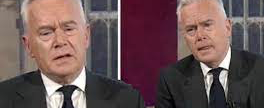
According to Newsnight, one current staff member claimed they were contacted on social media by him, and the messages left them feeling uncomfortable as well as awkward.
The messages were reportedly suggestive in nature, appeared to be flirtatious, and referred to the appearance of Mr Edwards’ colleague. “There is a power dynamic that makes this inappropriate”, the staff member said.


Another BBC employee alleged that Mr Edwards had also sent them a private message on social media which commented, too, on their appearance and gave them a “cold shudder”.
During the days in which Mr Edwards went unnamed as the presenter at the centre of the alleged sex scandal, the publicist and strategist Mark Berkowski told Times Radio: “We’ve got a situation where it’s an ongoing car crash and the BBC is so glacial about how they’re dealing with this, because this is a 21st century problem,”
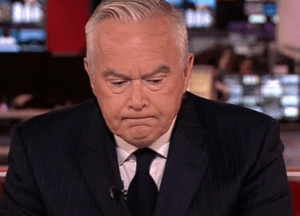
David Keighley, the former BBC news producer and director of News-watch, spoke of “reputational damage” to the man’s colleagues.
Mr Edwards was the BBC’s most well paid newsreader in a pay bracket of £435,000 to £439,999 – putting him fourth on the top 10 list, the corporation’s annual report revealed – yet it has now all come crashing down, and Wales has featured prominently.
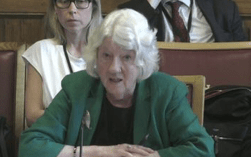
Mr Edwards is himself proudly Welsh (he was born in Bridgend), and the then acting chairwoman, Dame Elan Closs Stephens, is also from Wales, and said the BBC had behaved properly
But she and Mr Davie, were forced to answer important questions about the corporation’s attitude during the affair, following suggestions that it did not properly investigate the original complaint.
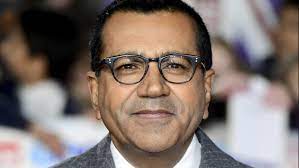
Both were closely questioned in the UK Parliament in front of the Lords Communications Committee. Dame Elan told peers that despite “huge pressure” to name Mr Edwards, the corporation “had a duty to act with some calm and rationality in the face of lack of rationality and lack of calm”.
Or how about the astonishing Martin Bashir incident?
Mr Bashir had apparently told colleagues “professional jealousy” and racism (he was born in London to Pakistani parents) were to blame for allegations that he secured an interview with Princess Diana through deceit.
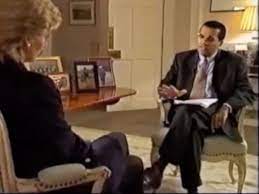
Mr Bashir wrote this in 2020 (emails show) – months before a BBC Panorama programme exposed the scandal surrounding his infamous 1995 interview, in which the Princess said of her relationship with the then Prince Charles: “There were three of us in this marriage”. A damning report found that Mr Bashir had faked bank statements and showed them to Earl Spencer, the Princess’s brother, in order to gain access to her. “At the time, it was also apparent that there was some irritation that a second-generation immigrant of non-white, working class roots should have the temerity to enter a Royal Palace and conduct an interview”, Mr Bashir proclaimed.
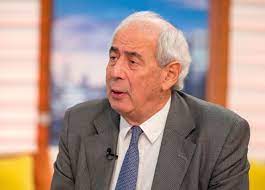
As the celebrated biographer and journalist, Tom Bower, put it pithily in the letters page of The Times: “Sir, How can the three BBC governors asked to investigate the circumstances surrounding the Bashir case be expected to give an objective critique? Two of them have been governors for some years and clearly never asked why Bashir was rehired despite widespread knowledge of his past”.
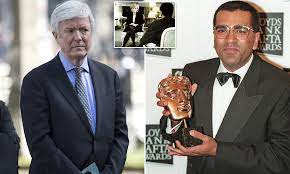
Mr Bashir rejoined the BBC in 2016, before a year afterwards being made religion editor following a ‘review’ led by (then BBC Director-General) Lord Tony Hall of Birkenhead, who knew some of the details. “In the wake of the Dyson report (which examined the remarkable events) there are serious questions still left to answer. Namely, why was Martin Bashir rehired, with the BBC knowing what they knew? I am writing to the BBC’s Director-General, Tim Davie, for urgent answers”, declared Julian Knight, MP, then chairman of the Commons Digital, Culture, Media and Sport Committee.

All of these bizarre episodes (I was at the BBC for 23 years and have been left shocked by what has occurred) happened on Mr Davie’s watch, yet now amazingly staff are being told to do more to attract audiences.
In order to reach out to those people, perhaps they could do worse than put the corporation’s HOUSE IN ORDER!










